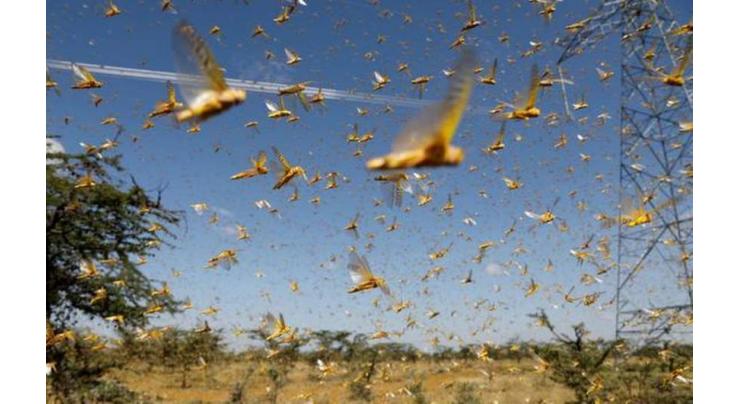
- Home
- Pakistan
- News
- Country facing locust threats coming from Indian side, swarms from Africa, Oman reduced
Country Facing Locust Threats Coming From Indian Side, Swarms From Africa, Oman Reduced
Muhammad Irfan Published August 07, 2020 | 09:34 PM

Minister for National Food Security and Research Syed Fakhar Imam here on Friday said that threats of desert locust attacks from Horn of Africa, Oman and Yemen was reduced, however currently country was facing locust threats coming from Indian side
ISLAMABAD, (UrduPoint / Pakistan Point News - 7th Aug, 2020 ) :Minister for National food Security and Research Syed Fakhar Imam here on Friday said that threats of desert locust attacks from Horn of Africa, Oman and Yemen was reduced, however currently country was facing locust threats coming from Indian side.
He stated this while chairing the meeting of National Locusts Controle Centre(NLCC)on Friday.
Lieutenant General Moazzam Ejaz,Coordinator NLCC also co-chaired the meeting, said a press release.
The meeting was informed that about 4,815,400 hectares have been surveyed, where as anti-locust operation was carried out in 1,093,400 hectares across the effected areas in the country.
It was informed that right now locusts is present in only one district like Tharparkar.
Food and Agriculture Organization shared its locust forecast and as per the forecast, in Southwest Asia, the situation has improved in Iran where few if any locust infestations remain.
However, the current situation remains serious along both sides of the Indo-Pakistan border where monsoon breeding is underway by spring-bred swarms, including those returning from northern India, and substantial hatching and band formation are expected in August.
A second generation of summer breeding will start in September. extensive control operations are in progress in both countries.
Pakistan Meteorological Department mentioned that rain, wind thundershowers are expected in Sindh, south Punjab and Balochistan.
Rain-thundershowers are also likely to occur in upper Punjab, Upper Khyber Pakhtunkhuwa and Kashmir. Heavy fall in Kalat, Khuzdar, Lasbella, Awaran, Panjgur, Kech and Gawadar was also forecast.
It was mentioned that Space & Upper Atmosphere Research Commission of Pakistan (SUPARCO), is using space-based information to analyze areas with regards to their suitability as desert locust habitats based on vegetation, soil type and other factors.
The results support surveillance and control operations by helping demarcate locust-prone areas.
National Information Technology board (NITB) also briefed about NLCC website.
Meanwhile, Punjab Province informed that 14,583,148 hectares have been surveyed and 458,960 hectares have been treated and recent operation is being carried out in Cholistan.
Representatives of Balochistan Government apprised the meeting that 15,932,993 hectares have been surveyed and 472,487 hectares been treated.
In Khyber Pakhtunkhwa survey was conducted over 8,052,726 hectares control operation was carried out in 62,535 hectares.
In Sindh Province survey was completed on 9,460,053 hectares, where as 101,168 hectares have been treated.
Related Topics
Recent Stories

Mired in crisis, Boeing reports another loss

Session Awarding Ceremony 2024 held at Cadet College Muzaffarabad

Austrian ski great Hirscher to make comeback under Dutch flag

Pakistan, Japan agrees to convene 'Economic Policy Dialogue'

FM Dar conveys deepest sympathy on torrential rains devastation in UAE

Spain PM Sanchez says weighing resignation after wife's graft probe

Tennis: ATP/WTA Madrid Open results - 1st update

Long-lost Klimt portrait auctioned off for 30 mn euros

Osaka seals first win on clay since 2022 in Madrid

Earthquake jolts Karachi

Sindh minister orders operation after attack on police in Ghotki

TikTok to fight US ban law in courts
More Stories From Pakistan
-
Pakistan, UK discuss collaboration in education sector
7 hours ago -
PMD forecast rain-windstorm/thunderstorm for various parts of country
7 hours ago -

Session Awarding Ceremony 2024 held at Cadet College Muzaffarabad
7 hours ago -

FM Dar conveys deepest sympathy on torrential rains devastation in UAE
8 hours ago -

Earthquake jolts Karachi
8 hours ago -

Sindh minister orders operation after attack on police in Ghotki
8 hours ago
-

Police book youngster for abusing student for one year
8 hours ago -

Police arrest 23 suspects, recover stolen money, phones
8 hours ago -

Colorful cultural festival concludes at NUML
8 hours ago -

Immunization awareness week kicks off in Balochistan
8 hours ago -

Ministers visit Aziz Bhatti Shaheed Hospital following roof collapse incident
8 hours ago -

IHC serves notices in petition against 'roti' price fixation
8 hours ago









